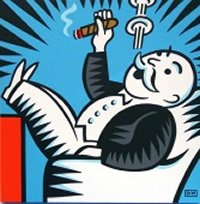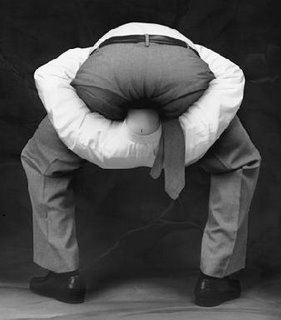
…their lucrative pension perk known as DROP.I am the last person who will claim that Philadelphia City Council is a model of moral or civic rectitude, and I have to admit that this was a good “rock” to turn over for the Inky, if you will, but until and unless CEO Brian Tierney and the rest of his merry management cohorts at Philadelphia Newspapers figure out how they’re going to give back the six-figure bonuses they received as noted here (h/t Atrios) while the Inquirer and Daily News face bankruptcy, then I don’t think they have the right to criticize anyone for financial transactions that don’t pass the “smell test.”
"I'm entitled to it," Council President Anna Verna said of the nearly $600,000 check she's in line to receive through the DROP program. That's on top of Verna's annual pension of about $130,000.
Councilwoman Marian Tasco also argued that her DROP payment of almost $500,000 is her money. She says Council members are being unfairly maligned for taking what is owed to them.
Here's where Verna, Tasco, and others on Council are not only wrong, but also extremely tone-deaf.
For starters, the DROP program was intended for city employees - not elected officials. Voters are supposed to decide when to "retire" an elected official, so there's no need for them to have the pension incentive.
Second, the DROP payment is supposed to come after you retire. But Councilwoman Joan Krajewski exploited a loophole that must be fixed before other elected officials slither through. After winning reelection last November, Krajewski retired for one day, collected her roughly $275,000 DROP check, and then was sworn in for another four-year term. This sleazy move in no way passes the smell test - even though former City Solicitor Romulo L. Diaz Jr. blessed the maneuver.

This time, Babington tells us the following about Obama’s recent announcement concerning the automakers (here)…
WASHINGTON – President Barack Obama is dealing with the beleaguered auto industry more sternly than he has with bailed-out banks and insurers as he takes the nation another step into uncharted government regulation of industry.I’ll admit that I don’t have a crystal ball, and neither does Babington. As I noted briefly yesterday, I don’t know how much more the UAW is supposed to give back, and judging from the early prognostications of former GM CEO Rick Wagoner’s replacement here, I also don’t know at this moment how GM is going to avoid bankruptcy (Chrysler certainly faces that if it doesn’t agree to the Fiat takeover…thank you, Bob Nardelli). But from what I read, I don’t know of any other way around what Obama is proposing.
The decision could leave a lasting mark on his presidency, for good or for bad, in ways reminiscent of Ronald Reagan's battle with air traffic controllers or Harry Truman's showdown with striking steelworkers.
However, the comparison Babington makes to Truman here is specious at best. As Wikipedia tells us here, there was a good bit of economic upheaval in this country after World War II during Truman’s administration, because labor/management issues had largely remained dormant while fighting the war, and they sprung back with a vengeance. Also, no sooner had we started to reap the benefit of the prosperity earned by leading the fight against nation states bent on world domination than we ended up fighting another war in Korea (with steel being critical for both military and civilian uses of course).
Truman referred the matter of the impasse in the steel industry to his Wage Stabilization Board (noted here), though apparently they were not able to resolve it either, leading Truman to call upon his Secretary of Commerce, Charles W. Sawyer, to take over the nation’s steel mills to ensure production, a move which was eventually ruled unconstitutional by the Supreme Court in a major separation-of-powers decision. I know of no one who managed to lose their jobs as a result of these actions (not saying it didn’t happen, just saying I can’t find information on it).
And if Babington’s comparison to Truman is questionable, his comparison to Reagan (who was shot 28 years ago yesterday, by the way) is utterly ridiculous.
Reagan’s firing of the air traffic controllers in 1981 based on a 1955 law disallowing strikes by government workers was the proverbial “green flag” given to industry to no longer honor a right to strike by their employees. As this NPR link tells us, the strike broke PATCO, the air traffic controllers union, and though the new union was formed in October of that year, it wasn’t certified to allow bargaining until 1987, and it took President Clinton to end the prohibition on rehiring any air-traffic controller who went on strike (to date, the FAA has rehired about 850 PATCO strikers); Clinton did that in 1993.
How Obama can be compared to the most antagonistically anti-union president this country had seen until Dubya came along is a question Babington should be asked “with extreme prejudice” by his superiors.

See, the Times gives this guy his little perch in the Sunday Magazine from which he can pontificate about the subtleties and nuances of the English language, which is fine. And as noted here from a couple of days ago, he compared the concept of bipartisanship to sex (an interesting notion).
And I thought that was OK, until I read this…
“The White House Misfires on Limbaugh” was The Wall Street Journal’s headline over a column by the former Bush “guru” Karl Rove, who is now enjoying the delights of being on the kicking rather than the receiving team. After the new press secretary, Robert Gibbs, took the opportunity to change the subject of economic distress by zapping a controversy-loving media critic, Rove wrote in defense of the conservative commentator: “Presidents throughout history have kept lists of political foes. But the Obama White House is the first I am aware of to pick targets based on polls. Even Richard Nixon didn’t focus-group his enemies list.” The Journal’s embedded subhead punched up the column’s message: “Aren’t there more important things to do than create an enemies list?”And of course, Rove’s claim and the rather bald-face insinuation that the Obama White House compiles an “enemies list” went thoroughly unchallenged by Safire.
This is typical for a guy who, as David Corn notes here, wrote an utterly specious column in February 2004 claiming an Iraq-al Qaeda link (gosh, remember when that was all the rage, as the Bushco spinmeisters seemed to crank out new “evidence” of that every week, with none of it actually standing up of course?) and also wrote a series of columns accusing several French companies of helping Iraq obtain rocket fuel components (wrong again, though this played well during the era of “freedom fries” and “freedom toast”).
Actually, I must confess myself to an interest in the use and meaning of words (big surprise, I know), so I actually share a bit of that with Safire, though of course I don’t have his pedigree. So, I’d like for him to thoroughly examine the meaning and derivation of the following word in his next column.
R-E-T-I-R-E-M-E-N-T.
No comments:
Post a Comment